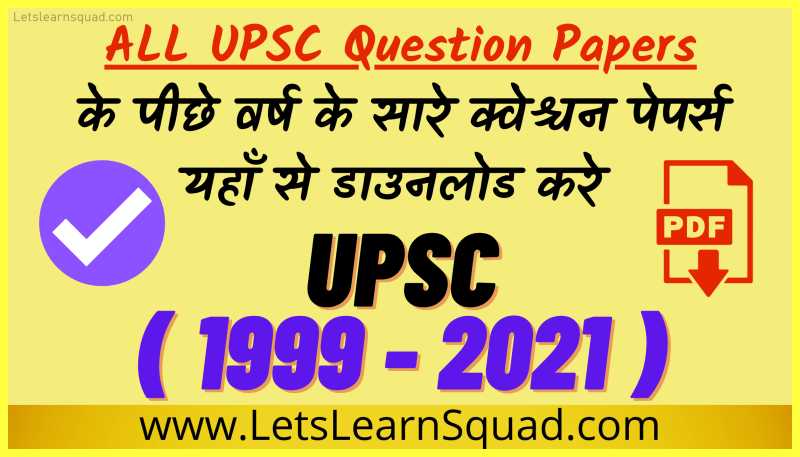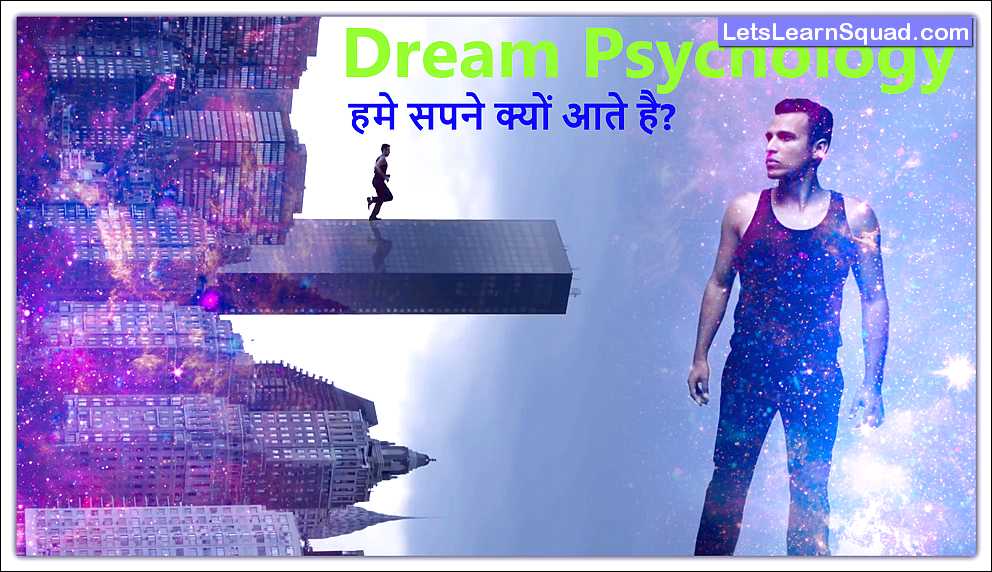( 1999 – 2021 ) Last 10+ years UPSC Question Papers with Answers PDF Download
In this article, we will give you Full info related to UPSC, Last 10 years UPSC Question Papers with Answers PDF Download ( 1999 – 2021 ) we will provide you with the Previous Years Question Papers From 1999 to till Now, and with this, we will provide you the UPSC Syllabus pdf + info on How to Prepare for UPSC in 3 Different Ways, you have three ways to start your Journey, Three Scenario Provided below to crack UPSC IAS EXAM and Total of 358 Topics in which the whole UPSC syllabus is divided including Mains, Prelims, and Interview. All GS1 + GS2 + GS3 + GS4 Topics Name List Given Below.
Previous Year Question Papers Download Links is Here
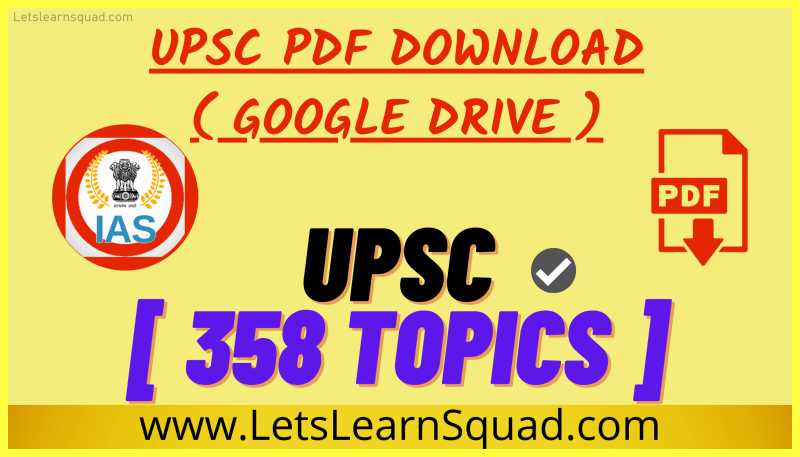
| GOOGLE DRIVE Links | Names |
| Download Link | COMPLETE CSAT FOLDER ( PDF LIST ) |
| Download Link | COMPLETE GS MAINS FOLDER ( PDF LIST ) |
| Download Link | COMPLETE GS PRE FOLDER ( PDF LIST ) |
| Download Link | NOT NECESSARY |
| Download Link | UPSC STUDY MATERIAL LIST
( OPEN THIS LINK AFTER READING THE COMPLETE PAGE ) SEE DOWNSIDE, READ ALL HEADINGS, AND THEN RETURN HERE |
*** How to Start Preparing for IAS? Scenario 1 ***
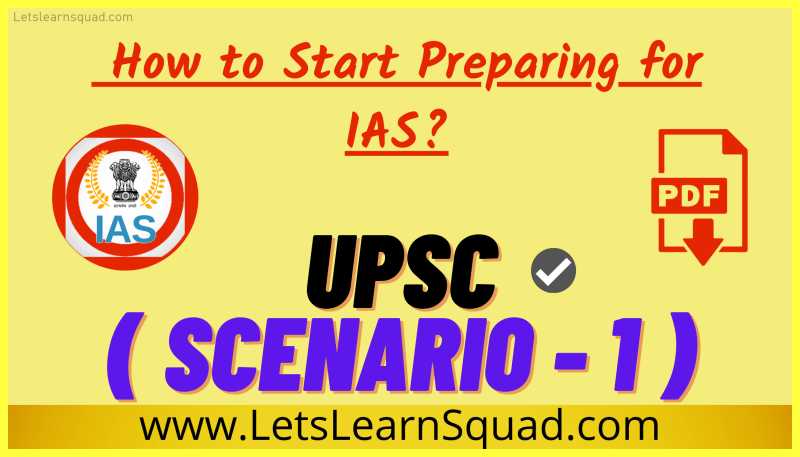
First of all, read the syllabus carefully to know what to read what to skip
Start From Ncert
- History: 6 – 12
- Geography: 6 – 12
- Economics: 9 – 12
- Polity: 9 – 12
- Art and culture: 11th class book
- read newspapers daily – only the topics related to UPSC CSE syllabus, and focus on editorials
- First, go through gs papers
- Then, after passing 1 – 2 months- decide your optional subject, which should be according to your interest
Note: start practicing answer writing as soon as possible, see previous years’ papers first.
#GS1
- for post-independence (history) – you can watch the Pradhan Mantri series on youtube to develop some interest in this topic; India after Gandhi by Ramchandra Guha
- world history – norman lowe
iii. ancient history – old NCERT R.S. SHARMA
- medieval history – Old NCERT SATISH CHANDRA
- modern history – the latest version of SPECTRUM
- Old NCERT of history – class 6th -12th
vii. art and culture – NITIN SINNGHANIA
viii. Old NCERT 6th – 10th GEOGRAPHY – brief reading ;
- Old NCERT 11th – 12th GEOGRAPHY – thoroughly reading ;
- as the standard book for GEOGRAPHY – YOU CAN refer to G.C. leong if you want otherwise NCERT’s are sufficient; This website ; an atlas
#GS2
- old NCERT 6th – 12th pOLITY;
- LAXMIKANTH, current affairs – editorials ;
iii. PIB, PRS ;
- Vision IAS notes for pressure GP, NGO ;
- for governance – refer to 2nd ARC reports – 1,4,9,10,11,12
- for social justice – Current affairs from newspaper
vii. International relations – refer to editorials, ministry of external affairs website
#GS3
- NCERT 9TH – 12th – economics; standard book – Sanjiv Verma or Ramesh Singh refer to only one book; current affairs – editorials;
- science and tech .- vision IAS, and editorials from newspapers and if you want to know some extra related to science and tech acc. to your interest refer to TMH book
- Niti Aayog – 3 yr action agenda, budget, and economic survey, Investopedia web . ; orthopedic web. ;
- environment – 12th bio chapter – 13to16; SHANKAR IAS BOOK – brief reading; current affairs editorials; vision IAS; PIB; PMF IAS
- INTERNAL SECURITY – internal security and disaster management book by ASHOK KUMAR and VIPUL; current affair editorials
- disaster management – 2nd – 3rd ARC report – Crisis management; NDMA guidelines (available online); current affairs
#Ethics And GS4
4th and 12th report of ARC, Ethics in governance and citizen-centric administration, lexicon or gs Subbarao – refer to only 1 book
#ForPrelims
- basic books – same
- VISION IAS PT 365
- any compilation on govt. schemes’; Previous year questions
*** How to Start Preparing for IAS? Scenario 2 ***
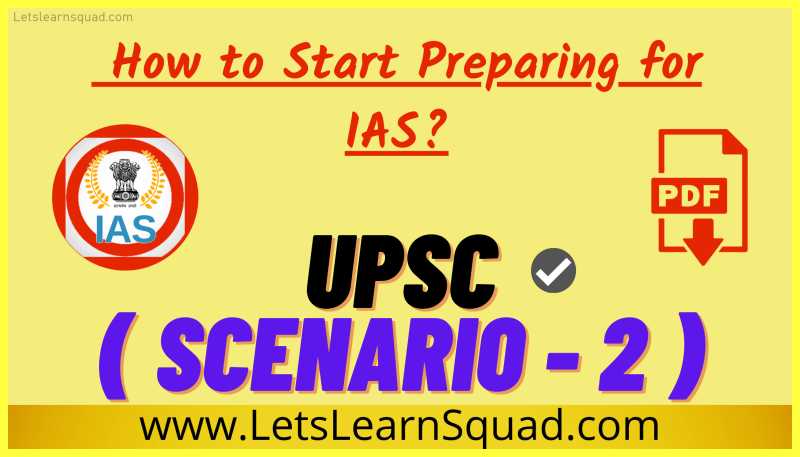
✍️✍️SCHEDULE FOR SINGLE HAND PERSONAL GUIDANCE FOR 2020/ 2021/2022 BATCH ASPIRANTS ✍️✍️
- Sunday:- ESSAY WRITING
- Monday:- ETHICS
- Tuesday:- G.S PAPER I
- Wednesday:- G.S PAPER II
- Thursday:- G.S PAPER III
- FRIDAY ✍️
- PSIR PAPER-I B. GEOGRAPHY PAPER -I
- HISTORY PAPER-I
- Saturday ✍️
- PSIR PAPER – lI
- GEOGRAPHY PAPER-II
- HISTORY PAPER-II
✍️✍️Your MENTOR can guide you for your UPSC exam preparation from zero level in following some steps:
- Syllabus ANALYSIS
- At least 10 yrs PYQ ANALYSIS
- NCERT / Reference books ANALYSIS
- CHOOSE OPTIONAL
- NEWSPAPERS ANALYSIS
- MAGAZINE
- General studies, the static part
- Optional subject
- . Writing skills for understanding questions, STRUCTURE, contents, and some basic needs in following steps
- A) Make the primary reading of any topic, a touch louder:
- B) Understand and not just read, the second time:
- C) Revise, Revise & Revise:
- D) Solve Previous Year Papers:
- E) Mains all GS papers including essay writing and ETHICS plus OPTIONAL PAPERS Test Series solutions.
✍️✍️The things you can EXPECT from your MENTOR…
- guidelines and Watch your Routine. One of the biggest roadblocks for the CSE is time management.
- Guidelines to Understand the Question Pattern.
- Guidelines to Plan a Structured Study strategies and studies schedule
- Guidelines to Practice Testing answer WRITTINGS
- Guidelines to Revision in a Priority-based
- The process of preparing notes for the topics from the syllabus.
- Going through PYQ ANALYSIS
- Syllabus ANALYSIS ie,, Allocating time to cover each area of the syllabus.
- Guide you in making sense of it all
Information on subjects and topics for the IAS exam abounds
- Guide you for Understanding the philosophy of the IAS exam
- Guidance for the correct sources
- Guide you for Knowing the weightage of each of the topics
- . Guide you for Preparing an action plan for revision
14 . Guide you in choosing an optional subject
- NCERT/ reference books list, study strategies, and PDF.
*** How to Start Preparing for IAS? Scenario 3 ***
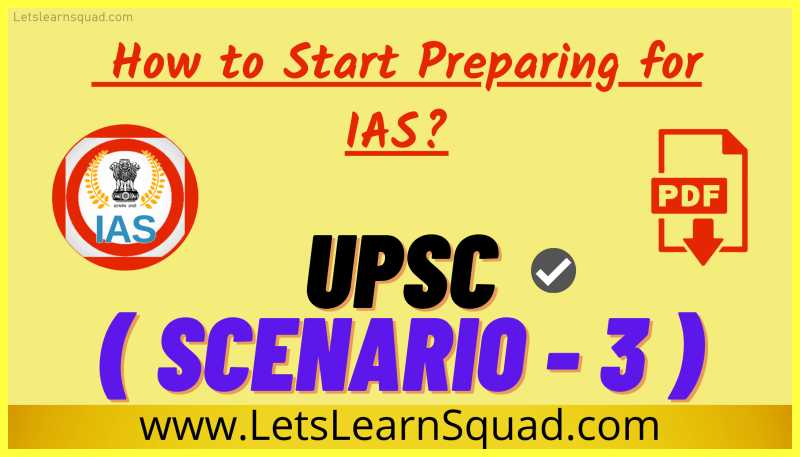
Hello aspirants 🙏
I am sure you’ve heard some toppers say – “I never expected this result!” Well, even they seem to be quite surprised at the way things turned out for them.
Put yourself in the shoes of the greatest emperor that’s ever lived. What would he have thought of this question?
Handling Pressure is one of the important aspects of UPSC Civil Services Preparation. Apart from the regular reading of NCERT books, newspapers, and other materials, aspirants like you should also focus on other essential aspects to overcome the stress factor.
1. Proper Planning
In UPSC Preparation you should have a proper study plan, many aspirants prepare without any study plan, and in the end, they were not able to sail through the exam. Develop a long-term (one year), monthly, and daily study plan. If you have a proper study plan then you can assess your exam preparation progress and you can easily identify your flaws in preparation.If you know, where you are lagging then you can work on that feature. But if you don’t know where you are lagging that adds excess stress in exam preparation. So have a proper study plan.
2. Regular Study Breaks
One cannot read continuously for 8 to 10 hours at a stretch and don’t overburden yourself. Psychological experts say that one cannot read effectively beyond 40 minutes. So take regular study breaks during your study period. Don’t think such breaks are not part of productive study time, in fact, it is part and parcel of your study hours to boost your exam preparation.
3. Stop comparing with others
Many aspirants face that fear factor and feel the pressure because they compare themselves with their friends and peers. Say for example, If your friend has qualified in UPSC exams and don’t compare yourself with him, instead compare your previous performance with the present and analyze what went wrong in your exam preparation.
One of the major reasons for exam stress is comparing it with others. Stop comparing with others from now onwards!
4. Be Positive
At any cost, don’t bring negativity to your exam preparation. Always stay positive. If you think and work with a positive attitude, you will definitely get positive results.
5. Focus on your preparation
There are many resources in this modern era to distract your IAS Preparation. You should not fall into those traps. Try to focus on your reading and exam preparation.
This is like a horse race, you should focus only on the target until you reach there. Never get distracted.
6. Believe in your ability
The other major reason for stress in IAS exam preparation is aspirants like you have self-doubts.
* Am I able to crack the IAS exam?
* Do I have the potential to clear UPSC?
* I am average in studies (school and College), will I able to get succeed in the IAS exam? And so on.
Stop questioning your ability.
Believe in yourself! Develop self-confidence and say to yourself “I will crack the IAS exam this year”
7. Develop a Hobby
Spend some quality time on extracurricular activities to overcome the exam preparation stress. If you don’t have any hobby or interest, try to develop a hobby and spend some quality time on a regular basis during exam preparation. Hobbies give you relaxation and a peaceful mind.
8. Meditation / Yoga
Spend 10 to 15 minutes in the early morning for meditation, it gives positive vibration and also improves your concentration while preparing for exams.
9. Good Sleep
Try to give some quality time for sleeping. Experts advise that a normal human being needs 7 to 8 hours of sleep to rejuvenate his energy.
10. Practice is the key to success
For practice, you can either solve UPSC’s previous year’s question papers or join a mock test to evaluate your exam preparation.
- 🔖 Also, develop a habit of regular answer writing practice to improve your mains answer writing skills in the UPSC Mains exam.
- 🔖 Constantly keep asking yourself – what will make me a winner? Am I doing everything that will? What is lacking?
- 🔖 UPSC Preparation is the toughest journey of your life. You may face many ups and downs, but what matters is your name getting listed in the final merit list.
- 🔖 Letting go when the time is right for it, and, and re-focussing on attainable goals is what makes a winner in the long run.
📍 * Be the Arjun. Find your Lord Krishna. Go through your own Bhagavad Gita * 📍
[ UPSC TIME TABLE]
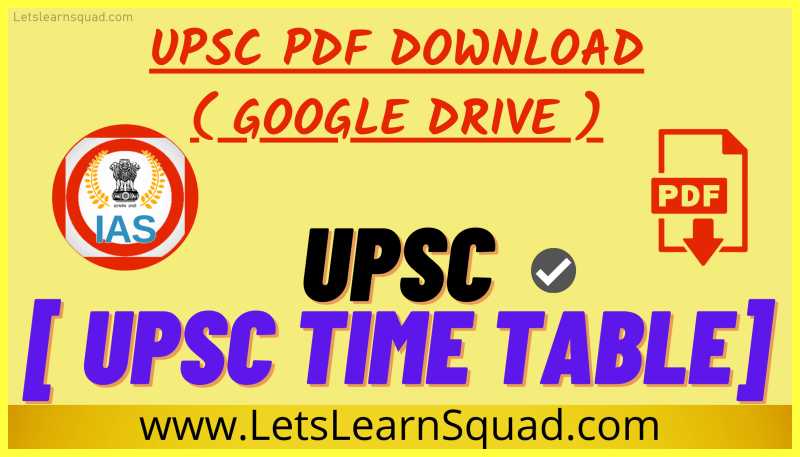
Many of you must be spending 10 hours+ every day on studies, yet you may be missing your timelines. Our weekly timetable strategy ensures that you are able to complete your syllabus fully & properly.
- We have divided the complete UPSC syllabus including Pre & Mains into 358 Topics. Of these, 239 are relevant for both Pre & Mains, while others are either specific to Pre or Mains.
- In our Weekly Timetable, you get the list of topics to be prepared in each week, in a way that all your 358 Topics are covered. For these topics, you will get complete content (Pre & Mains separately), and then a test every Sunday for both Pre & Mains.
Here we have given you a sample of 5 weeks. You can prepare a similar timetable on your own. Students Should Cover all 358 topics ( All Proper Topic List Given Below ) in 5 Weeks.
Week 1
- Indian Constitution – Features & Significant Provisions related to The Preamble, Union & Its Territories, and The Citizenship
- Indian Constitution – Amendments, Schedules, and Important Articles
- Pressure Groups, Other Formal-Informal Associations and their role in the Polity
- Role of NGOs, SHGs, Donors & Charities, and Institutional & other Stakeholders in Development Process
Week 2
- Indian Constitution – Features & Significant Provisions related to Fundamental Rights, Directive Principles, and Fundamental Duties
- Separation of powers between various organs
- Peoples’ Participation-Role of Civil Society in Governance
- Health & Sanitation and related issues
Week 3
- Comparison of Indian Constitutional System with that of other Countries – Parliamentary & Presidential Systems of Governance
- Executive: Structure, Organization & Functioning; Ministries and Departments of the Government
- The President and the Vice-President of India
- Education and related issues
- Human resources, Youth, Sports, and related issues
- Poverty & Hunger and related issues
Week 4
- Parliament – structure, functioning, the conduct of business, powers & privileges, and issues arising out of these
- Functions & Responsibilities of the Union, the Prime Minister, and Union Council of Ministers
- Functions & Responsibilities of the States, the Governor, the Chief Minister, and State COM
- Public Policy Making
- Other Social Welfare Bodies in India
- Important Aspects of Governance, Transparency & Accountability including Right to Information and Citizen Charter
Week 5
- State Legislatures – structure, functioning, the conduct of business, powers & privileges, and issues arising out of these
- Issues and Challenges Pertaining to the Federal Structure, Dispute Redressal Mechanisms, and the Centre-State Relations
- Devolution of Powers & Finances up to Local Levels and Challenges therein – Panchayats & Municipalities
- Emergency Powers of the Union
- E-governance – applications, models, successes, limitations, and potential incl. Aadhaar & Digital power
- India’s Foreign Policy evolution and changes
- India – Pakistan
- India – China
Topic-wise Analysis of UPSC Exam: IAS Exam: Civil Services Exam
Many students spend many years preparing for civil services exams. However, we have prepared a very scientific method of preparing for the IAS Exam. If you follow this method and Time – Table, we are sure that you will crack this exam in one attempt only. There is a Total of 358 Topics in which the whole UPSC syllabus is divided including Mains, Prelims, and Interview. These Topics are spread in 14 Subjects.
| 1. Indian Culture | 10 | 10. Indian Polity | 20 |
| 2. Indian Economy | 33 | 11. Ethics | 30 |
| 3. Modern India History | 27 | 12. Developmental Issues | 23 |
| 4. Science & Technology | 11 | 13. Prelims Only Topics
(mixed ones) |
43 |
| 5. Post-Independence India History | 10 | 14. International Relations | 69 |
| 6. Environment | 5 | 15. World History | 7 |
| 7. Security Related Matters | 8 | 16. Indian Society | 15 |
| 8. World & Indian Geography | 47 | ||
| 9. Total Topics – 358 | |||
Out of these 358 Topics, 239 are relevant for both Prelims as well as Mains. These topics must be prepared from pre-cum-mains perspective together.
| Topics relevant for both Prelims and Mains
(that is, Topics which need to be prepared from both Pre-cum-Mains perspectives) |
239 |
| Topics relevant for Mains only (prepared from majorly Mains perspective) | 76 |
| Topics relevant for Prelims only (prepared from both majorly Prelims perspective) | 43 |
| Total Topics – 358 | |
*** [ तपस्या आरम्भ ] ***
Before you prepare any topic, you must analyze which type of questions are asked from that topic, which kind of current news is coming related to that topic, etc. View the complete list of Topics of the syllabus here along with Previous Years’ Questions asked & News related to the topic as well as relevant NCERTs & Rajya Sabha Expert Videos related to the topic –
Topics to Prepare For GS 1
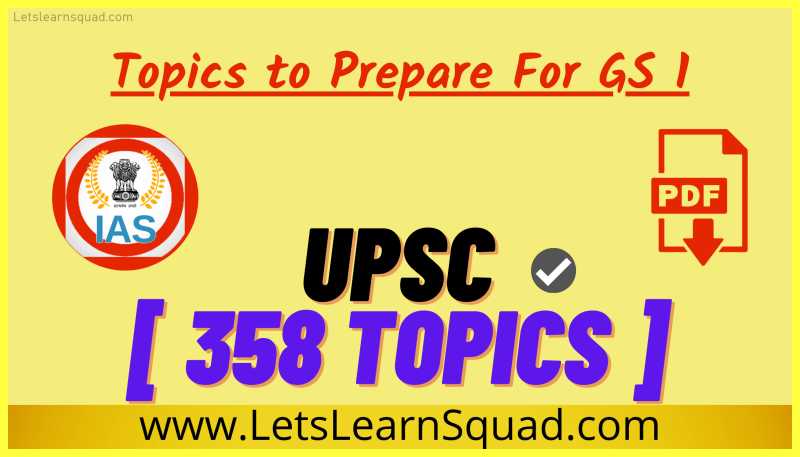
- Indian Culture – An Introduction
- Indian Architecture incl. Art & Craft & Paintings
- Indian Music and Dances
- Performing Arts, Drama, Theatre, and Indian Cinema
- Indian Languages and Literature
- Fairs & festivals and Martial Arts of India
- Media and Culture
- Promotion and Preservation of Culture Include UNESCO
- Famous personalities & institutions attached to Indian culture
- Religions, religious thoughts, and Philosophy incl. Saints of India
- The Decline of the Mughal Empire
- Indian States and Societies in 18th Century
- The Beginnings of European Settlements
- The British Conquest of India
- The Structure of the Government and Economic Policies of the British Empire in India, 1757-1857
- Administrative Organization and Social & Cultural Policy
- Social & Cultural Awakening in the First half of the 19th Century
- The Revolt of 1857
- Religious and Social Reform Movements
- The Struggle Begins (1858-1905)
- National Movement (1905-1918)
- National Movement (1919-1939) Era of Mass Nationalism
- National Movement: Towards Freedom and Partition (1939-1947)
- Administrative Changes after 1857
- Economic Impact of British Rule in India
- Development of Indian Press
- Development of Education
- Brief on some aspects of British Rule
- The Indian States
- Civil Rebellions and Tribal Uprisings
- Peasant Movements (1857-1947)
- The Movement of Working Class
- The Evolution of Indian Nationalist Foreign Policy
- Communalism and Trends
- Role of women in the freedom struggle
- Contributions of British & Foreigners
- Important Persons during freedom struggle & their Approaches to the achievement of freedom goals
- Challenges of National Building
- The era of One-party Dominance
- Politics of Planned Development
- Economics of planned development
- India’s External Relations
- Challenges to and Restoration of the Congress System
- The Crisis of Democratic Order
- Rise of Popular Movements
- Regional Aspirations
- Recent Developments in Indian Politics
- Industrial revolution
- The World From the 1890s to the First World War
- The World Between the two World Wars
- The Second World War
- Colonization, Decolonization, and Redrawl of National Boundaries
- Political Philosophies- Communism, Capitalism, and Socialism
- The World Since 1945
- Structure of Indian Society incl. Caste system
- Social Institutions: Continuity and Change
- Social Inequality and Exclusion
- The Challenges of Unity in Diversity
- Dawn of Independence and The Challenges for Nation Building
- Structural and Cultural Change
- The Story of Indian Democracy
- Change and Development in Rural and Industrial Society
- Mass Media and Communications
- Social Movements
- Role of Women and Women’s Organization
- Poverty and developmental issues
- Urbanization, their problems, and their remedies incl. Migration & Smart Cities
- Globalization and Social Change – Effects of globalization on Indian society
- Social empowerment
- Regionalism, Communalism & Secularism
- Physical Geography of Africa incl. important Geopolitical regions
- Physical Geography of Asia incl. important Geopolitical regions
- Physical Geography of Europe incl. important Geopolitical regions
- Physical Geography of North America incl. important Geopolitical regions
- Physical Geography of South America incl. important Geopolitical regions
- Physical Geography of Australia incl. important Geopolitical regions
- Physical Geography of Antarctica incl. important Geopolitical regions
- Disputed Territories of the World
- Distribution of Key Natural Resources – Minerals & Oil Resources of the World
- Distribution of key Natural Resources – Mineral & Oil Resources of India
- Distribution of Key Natural Resources – Energy Resources of the World
- Distribution of Key Natural Resources – Forest Resources of the World
- Distribution of key natural resources – Land Resources incl. Land conservation in world & India
- Distribution of key natural resources – Ocean Resources in world & India
- Distribution of key natural resources – Water Resources incl. Rivers & related issues in world & India
- Natural regions and the world climates
- Agriculture and Major Crops of the World
- Biotic Resources of the World including Livestock & Fisheries
- Factors responsible for Location & Distribution of Primary Industries in World
- Factors responsible for the Location & Distribution of Secondary Industries of the World
- Factors responsible for the location of Tertiary sector Industries incl. Tourism in world & India and related issues
- Transportation and Communication of the World
- International Trade
- Demography of the World – Population Trends
- Demography of the World – Growth of Population
- Demography of the World – Demographic Attributes
- Demography of the World – Major Tribes and their Habitats
- Important Geophysical phenomena – Earthquakes, Tsunamis & Volcanoes
- Important Geophysical Phenomenon – Atmosphere, its Composition, and Circulation
- Important Geophysical Phenomenon – Tides, Oceanic Circulation and Ocean Bottom Relief
- Important Geophysical phenomena – Weathering, Mass Movement & Groundwater
- Various Landforms, Changes Therein and the Effects of Such Changes
- Islands & Coral Reefs, changes therein and in Flora & Fauna and the Effects of such changes
- Mountains, changes therein and in Flora & Fauna and the Effects of such changes
- Lakes, changes therein and in Flora & Fauna and the Effects of such changes
- Rivers, changes therein and in Flora & Fauna and the Effects of such changes
- Changes in Flora & Fauna in general and the effects of such changes
- The Earth, its Evolution and Origin of Life on Earth
- The Earth and the Solar System
- Interior of the Earth and Materials of the Earth’s Crust
- Climate and Weather & Changes in Climate
- Important Geophysical Phenomenon – Tropical Cyclones
- Important Geophysical Phenomenon – Temperate Cyclones
- Physiography of India including Geology
- Indian River System Including Lakes, and HEPs
- Indian Soils & Natural Vegetation
- Indian Climate including Monsoons
- Indian Demography including Tribes
- Important Terms in Economics
- Important Schemes & Programmes of the Government
- How to Prepare Prelims
- Few Facts About Ancient India
- Current Affairs
- Others
- Physics-related matters
- Magnetism and Electricity
- Heat and Temperature
- Light
- Sound
- Waves
- Work, Power, and Energy
- Mechanics
- Properties of Substances
- Important Terms of Physics
- Chemistry related matters
- Bio-Chemistry & Atomic Chemistry
- Metals and Metallurgy
- Biology related Matters
- Biology – The Study of Life
- Body Parts and their Processes
- Essential Minerals of the Body
- Human Diseases
- Organization in Plants
- Animal Phyla
- Miscellaneous Science Related Topics
- History up to Indus Valley Civilization
- Vedic & Later-Vedic periods
- Mahajanapadas, Mauryans & Post-Mauryans
- Jainism & Buddhism and Hindu Schools of Philosophy
- Sangam Period & Age of Satvahanas
- Guptas & Harsha time
- States of Deccan & South India
- Travelers in India
- Turkish Invasions & Rajputs
- Delhi Sultanate
- Vijaynagar Empire, Regional Kingdoms & Surs
- The Mughal Empire
- Rise Of Marathas And The Sultanates Of Deccan
- World Religions & Languages
- Other Organisations of the World
- Important Places & Personalities (World & India)
- India Year Book & Economic Survey
- Important Prizes and Related Facts
- Important Wars in the World
- Few Facts about Countries
- Few Facts about India
- Miscellaneous Facts
- Synopsis of Rulers of Medieval India
Topics to Prepare For GS 2
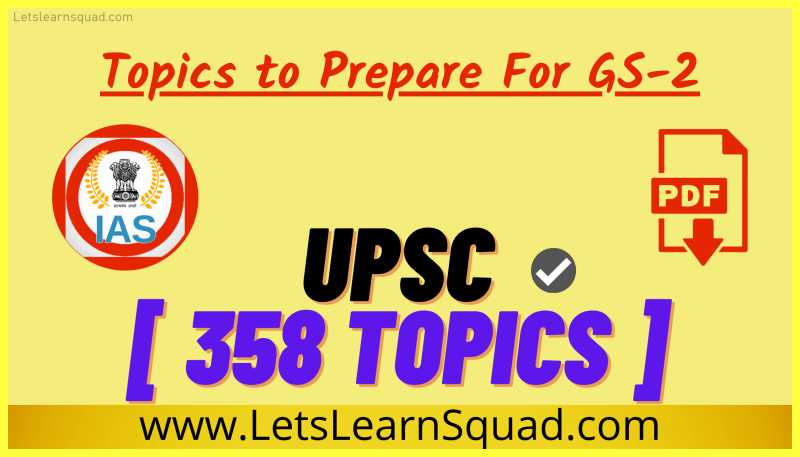
- Indian Constitution – Historical underpinnings & Evolution
- Indian Constitution – Features & Significant Provisions related to The Preamble, Union & Its Territories, and The Citizenship
- Indian Constitution – Features & Significant Provisions related to Fundamental Rights, Directive Principles, and Fundamental Duties
- Indian Constitution – Amendments, Schedules, and Important Articles
- Comparison of Indian Constitutional System with that of other Countries – Parliamentary & Presidential Systems of Governance
- Separation of powers between various organs
- Executive: Structure, Organization & Functioning; Ministries and Departments of the Government
- The President and the Vice-President of India
- Functions & Responsibilities of the Union, the Prime Minister, and Union Council of Ministers
- Parliament – structure, functioning, the conduct of business, powers & privileges, and issues arising out of these
- Functions & Responsibilities of the States, the Governor, the Chief Minister, and State COM
- State Legislatures – structure, functioning, the conduct of business, powers & privileges, and issues arising out of these
- Issues and Challenges Pertaining to the Federal Structure, Dispute Redressal Mechanisms, and the Centre-State Relations
- Emergency Powers of the Union
- Devolution of Powers & Finances up to Local Levels and Challenges therein – Panchayats & Municipalities
- Judiciary in India: its Structure, Organization & Functioning, Judges of SC & High Courts, Judgments and related Issues
- Elections, Election Commission and the Electoral Reforms in India Incl. Political Parties
- Provisions related to UPSC, State PSCs and Civil Services in India, and their Role in Democracy
- Finance Commission
- Audit & CAG of India
- Regulatory & Quasi-Judicial bodies
- Pressure Groups, Other Formal-Informal Associations and their role in the Polity
- Role of NGOs, SHGs, Donors & Charities, and Institutional & other Stakeholders in Development Process
- Peoples’ Participation-Role of Civil Society in Governance
- Government policies & interventions for development in various sectors and issues arising out of their design & implementation incl. Housing
- Rights & Welfare of STs, SCs, and OBCs – Schemes & their Performance, Mechanisms, Laws Institutions, and Bodies
- Rights & Welfare of Women – Schemes & their Performance, Mechanisms, Laws Institutions and Bodies
- Rights & Welfare of Children – Schemes & their Performance, Mechanisms, Laws Institutions and Bodies
- Rights & Welfare of Old-Age People – Schemes & their Performance, Mechanisms, Laws Institutions and Bodies
- Rights & Welfare of Persons with Disability including Mentally Ill People – Schemes & their Performance, Mechanisms, Laws Institutions and Bodies
- Rights & Welfare of Minorities Incl. Linguistic Minorities – Schemes & their performance; Mechanisms, Laws, Institutions & Bodies
- Rights & Welfare of People with HIV-AIDS – Schemes & their Performance, Mechanisms, Laws Institutions and Bodies
- Rights Issues – Human Rights and NHRC
- Rights Issues – Consumer Rights in India
- Rights Issues – Other Rights
- Other Social Welfare Bodies in India
- Important Aspects of Governance, Transparency & Accountability including Right to Information and Citizen Charter
- E-governance – applications, models, successes, limitations, and potential incl. Aadhaar & Digital power
- Health & Sanitation and related issues
- Education and related issues
- Human resources, Youth, Sports, and related issues
- Poverty & Hunger and related issues
- Public Policy Making
- India’s Foreign Policy evolution and changes
- India – Pakistan
- India – China
- India – Nepal
- India – Bhutan
- India – Afghanistan
- India – Bangladesh
- India – Myanmar
- India – Sri Lanka
- India – Indian Ocean Island nations
- India – USA
- India – Russia
- India – Japan
- India – East Asia
- India – Middle East
- India – Central Asia
- India- West Asia
- India – Israel
- India – UK
- India – Australia
- India – South America
- India – Canada
- South-East Asia, ASEAN, and India
- SAARC and India
- BRICS, IBSA, and India
- BIMSTEC and India
- IOR-ARC and India
- SCO and India
- Mekong- Ganga Cooperation
- RCEP and India
- QUAD and India
- G20
- G8
- G77
- NAFTA
- Mercosur
- GCC
- OPEC
- OECD
- APEC
- CARICOM
- Rio Group
- TPP
- Africa, African Union (AU), and India
- Europe, European Union (EU), and India
- OSEE
- NATO
- CIS
- NAM and its relevance
- Commonwealth of Nations
- ASEM
- ACD and India
- UNASUR
- NSG and India
- ADB and India
- AIIB and India
- African Development Bank
- BIS
- League of Arab States (LAS)
- OIC
- FATF
- Effect of policies and politics of developed & developing countries on India’s interests
- Indian Diaspora
- UNO and its various Agencies
- World Trade, WTO, and issues involved
- World Bank and India
- IMF and India
- International Treaties & Agreements, and other important organizations
Topics to Prepare For GS 3
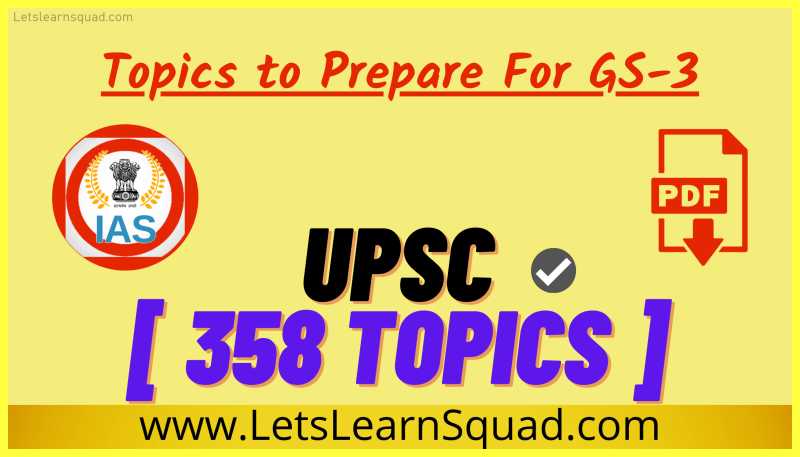
- Issues relating to Planning & Economic Reforms
- Community Of Latin American And Caribbean States (CELAC)
- Issues relating to Mobilization of resources incl. Savings, Borrowings & External Resources
- Issues relating to Growth & Development – Inflation & Monetary Policy
- Issues relating to Growth & Development – Public Finance, Taxation & Black Money incl. Government Budgeting
- Issues relating to Growth & Development – Banking, NPAs and RBI
- Issues relating to Growth & Development – Capital Market & SEBI
- Issues relating to Growth & Development – Industry & Services Sector incl. MSMEs and PSUs
- Issues relating to Growth & Development – Foreign Capital, Foreign Trade & BOP
- Issues relating to Growth & Development – Demographic Economics & Various Indexes
- Issues Related to Poverty, Inclusion, Employment & Sustainable Development
- Agriculture Issues and related constraints
- Major Corps, Cropping Patterns and various Agricultural Revolutions
- Different types of Irrigation & Irrigation systems storage
- Transport & Marketing of agricultural produce
- Agricultural Finance & Insurance
- E-technology in the aid of farmers
- Issues related to direct & indirect Farm Subsidies and MSP
- Public Distribution System: Objectives, Functioning, Limitations & Revamping
- Issues of Buffer stocks and Food Security
- Technology missions
- Economics of Animal-Rearing incl. White, Blue & Pink Revolutions
- Food processing and related industries in India: scope and significance, location, upstream and downstream requirements and supply chain management
- Land reforms in India
- Effects of Liberalization on the economy, changes in industrial policy and their effects on industrial growth incl. Economic Reforms
- Infrastructure: Energy incl. Renewable & Non-renewable
- Infrastructure: Ports & Waterways
- Infrastructure: Roads
- Infrastructure: Airports
- Infrastructure: Railways
- Infrastructure: Economic Corridors
- Infrastructure: Urbanisation and related Issues
- Investment Models: PPP, SEZ, EPZ, and others
- Issues relating to Intellectual Property Rights (IPRs)
- Science and technology- developments and their applications and effects in everyday life
- Achievements of Indians in science & technology
- Indigenization of technology and developing new technology
- IT, Internet and Communications
- Defense-related developments
- Space Technology & related matters
- Computer Technology incl. 3-D Printing
- Nuclear science
- Robotics & Artificial Intelligence
- Nanotechnology
- Biotechnology, Genetics & Health-related developments
- Environmental Pollution – Air, Water, Soil & E-waste
- Environmental Degradation – GHGs, Ozone Depletion, and Climate Change
- Biodiversity, Ecology, and Wildlife Related Issues
- Environmental Conservation, Sustainable Development, and EIA
- Disaster and disaster management
- Linkages between development and spread of extremism incl. Naxalism
- Role of External State & Non-state actors in creating challenges to internal security incl. Terrorism & illegal Migration
- Challenges to internal security through Communication Networks
- Role of Media and Social Networking Sites in internal security challenges
- Basics of Cyber Security and related matters
- Security challenges and their management in Border Areas
- Linkages of organized crime with terrorism
- Various Security Forces & Agencies and their mandate
Topics to Prepare For GS 4
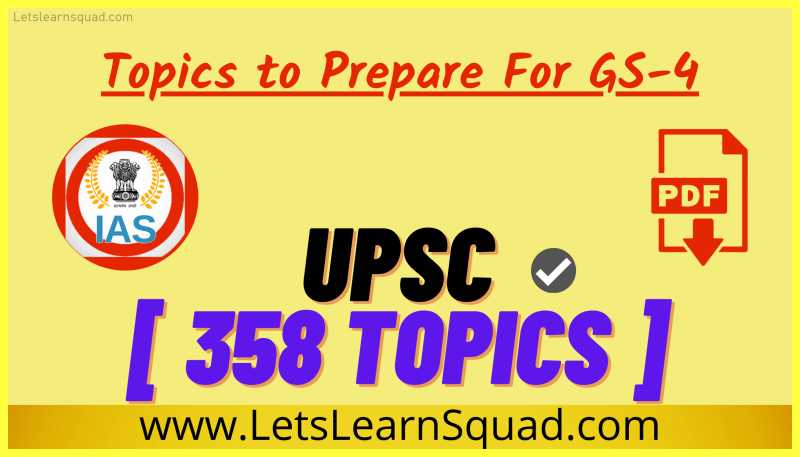
- Ethics and Human Interface: Essence, determinants, and consequences of Ethics in human actions
- Dimensions of ethics
- Ethics in Private and Public relationships
- Human Values – Lessons from the lives and teachings of great Leaders, Reformers, and Administrators
- Role of Family, Society and Educational institutions in inculcating values
- Attitude: Content, structure and functions, its influence & relation with thought & behavior
- Moral and political attitudes
- Social Influence and Persuasion
- Aptitude
- Foundational values for Civil Service – Integrity, Objectivity, Impartiality & non-partisanship
- Foundational values for Civil Service – Empathy, tolerance and compassion towards the weaker sections, and dedication to public service
- Emotional intelligence – Concepts, and their utilities & application in Administration and Governance
- Contributions of moral thinkers and philosophers from India
- Contributions of Moral thinkers and Philosophers from World
- Public-Civil service values and Ethics in Public administration: Status and problems
- Ethical Concerns & Dilemmas in Government & Private institutions incl. issue of “Conflict of Interest”
- Laws, Rules, Regulations, and Conscience as sources of Ethical Guidance
- Accountability and Ethical Governance
- Strengthening of Ethical and Moral Values in Governance
- Ethical issues in International Relations and Funding
- Corporate governance
- Probity in Governance: Concept of Public Service
- The philosophical basis of Governance and Probity
- Information Sharing and Transparency in government including RTI
- Codes of Ethics and Codes of Conduct
- Citizen’s Charters and Work culture
- Quality of service delivery
- Utilization of public funds
- Challenges of corruption
- Case Studies
GS Prelims Test Series consists of 4 parts–
- Part-1: Weekly Topicwise Fundamental Tests. These consist of 50 Qs each. Total 40 Tests. The objective of these tests is to build your base for various topics & improve your reading skills. (Test 1 to 40). (40 Tests * 50 Qs Each = 2000 Qs)
- Part-2: 5 Exclusive Current Affairs Fundamental Tests from covering Current Affairs from 1 January 2020 till 31 December 2020. The objective of these tests is to cover a lot of current affairs looking at their importance in the selection process. (Full-Length Test 1 to 5). (5 Current Affairs Tests * 100 Qs Each = 500 Qs)
- Part-3: 5 Subjectwise Applied Tests conducted every 15 days from mid-January to mid-March covering complete syllabus of a particular subject. The objective of these tests is to check your knowledge of a subject & accordingly strengthen your weak subjects. (Full-Length Test 6 to 10). (5 Subject Tests * 100 Qs Each = 500 Qs)
- Part – 4: 15 Comprehensive Full-Length Advanced Tests from mid-March to mid-May. Also, all Full-length Tests have 25% Questions from Current Affairs. Objectives To develop your speed to complete the paper and give you first-hand experience under exam conditions. (Full-Length Test 11 to 25). (15 Comprehensive Tests * 100 Qs Each = 1500 Qs)
Read Monthly Current Affairs E-Book + 1000 Current Affairs Qs in Pdf form at the end. Current affairs Should be well-prepared from 14 different sources like The Hindu, PIB, Indian Express, Live Mint, IDSA, PRS Blog, Yojana, EPW, Onlinestudypoints.com Website, Letslearnsquad.com Website, Testbookpdf.com Website, etc…
NOTE:- AFTER DOWNLOADING ALL STUFF + READING THE COMPLETE ARTICLE CLICK ON THIS LINK- ( CLICK HERE ) HERE YOU GOT UPSC STUDY MATERIAL, ALL UPSC HAND-WRITTEN COACHING NOTES IN HINDI + ENGLISH + SYLLABUS ETC… AND ONE MORE THING, YOU WILL BE AMAZED JUST JOIN THE TELEGRAM AND JUST WAIT 🙂
NEXT
CTET Previous Year Question Paper Download Pdf (2011 – 2021)
UPTET Previous Year Question Paper Download Pdf
REET Previous Year Question Paper Pdf Download
DSSSB Previous Year Question Paper Pdf Download
KVS Previous Year Question Paper Pdf Download
Army Public School Previous Year Question Paper PDF Download
OnlineStudyPoints ( All Exam pdf Download )
[ NOTE ]
All these PDFs which are provided right here or on This Website are simply for Education purposes, only for those who can’t afford paid materials or do not have the proper information, we provide Pdf Files with a download link. Please make use of them for constructing knowledge, fulfill All dreams, and don’t make them Commercial. We request you to recognize our Hard Work.
All our Advertisements are Decent commercials [ we don’t compromise in the Quality ] and if anyone has any trouble with the website or commercials please contact me at help@letslearnsquad.com
[ Help ]
If You Have Previous Year Question Paper of Your University or any Project Files & Assignment PDF then Share them With Thousand of Students Like You. Send Your PDFs Here !!
We will Publish your pdf File With your Photo and Name
Email ID: help@letslearnsquad.com
